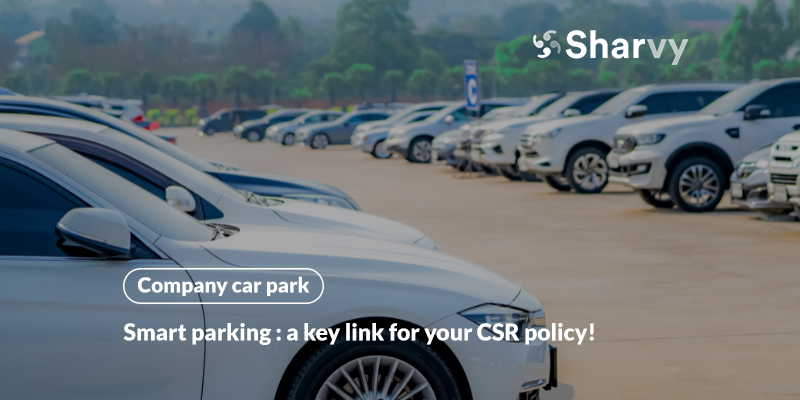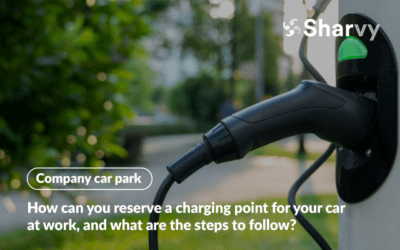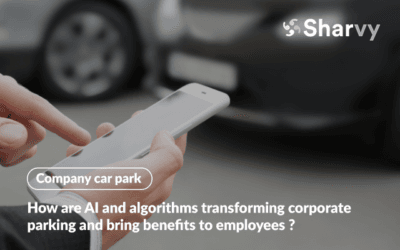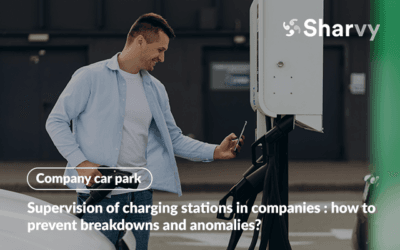Isn’t it time to (finally) shake things up within companies? Over the last few years, we can see the inertia of our mobility system is set to continue.
Despite the efforts already made to encourage the transition to sustainable mobility, dependence on the car for home-work commute is as strong as ever. More than 68% of Britons (still) make these commutes by car, according to a study by the Department for Transport.
Moreover, this behavior applies to long commutes, since 42% of employees whose place of work is less than 5 kilometers from home also choose to get there by car!
That’s why the journey between home and the office is an essential lever for companies looking to reduce their carbon footprint. The challenge is not just environmental: it’s also a question of rethinking these journeys in favor of soft mobility, geared towards employee comfort and reducing the intrinsic costs of travel.
Since the car park is the starting point and culmination of every commute, you must implement a parking policy and infrastructure that align with your CSR policy’s objectives.
Several solutions are flourishing to achieve this, but smart parking offers the most advantages for the company and its employees.
In this article, we look at the issue of parking in the city and find out why smart parking could become an essential part of your CSR policy.
1. The future of city parking and companies’ (crucial) role.
It’s hardly surprising that ¾ of daily home-work commutes are made by car. More than 40% of these commutes in town are less than 5km long. These journeys are, therefore, two times more polluting than longer-distance commutes (higher fuel consumption when the engine is cold, more frequent stopping and restarting, etc).
At the same time, motorists are bitterly aware that cities are gradually reducing the space available for cars. Not only are they creating more and more pedestrianized streets and LEZs (Low Emission Zones). They are also speeding up the development of cycle paths and public transport to reclaim the space initially given to cars. In correlation, they are limiting the number of parking spaces and/or opting for a system of dissuasive fines.
But reducing the number of parking spaces also has its share of negative externalities. Fewer parking spaces means more parking problems.
Today, an estimated 30% of urban traffic is generated by the search for a parking space. As a result, if these new measures increase urban traffic, particularly at peak times, it also leads to increased road congestion, more noise, and air pollution (20% of CO2 emissions are released during this period), and other longer-term effects on the development of hyper center districts.
Therefore, businesses have an essential role to play in developing airy, green, pedestrian-friendly cities, with a strong emphasis on intermodality and soft transport. They alone can shape the future of parking around a significant trend : smart parking.
2. The twofold advantage of smart parking : helping to improve parking in the city and enhancing your company’s CSR policy.
As an employer, we can’t tell you anything if we point out that you directly impact your employees’ mobility and the future of parking in the city.
To change this, more and more companies are opting for smart parking.
This is obvious because this concept aims to use digital technologies to optimize vehicle parking. For example, by installing :
- IoT sensors at each parking space (to detect the presence of a vehicle).
- Car park access control with automatic barrier opening.
- A number plate recognition system.
- A digital solution enabling users to reserve a parking space.
- Guidance to accessible areas via dynamic signposting, etc.
By its definition, it is easy to understand that smart parking must be integrated into smart cities and must be able to inform users in real-time of the saturation of a car park and the availability of parking spaces (for people with reduced mobility, two-wheelers, with a recharging point, etc).
In this way, the company is succeeding in :
- Relieve congestion in towns and cities : motorists who have reserved parking spaces are no longer dependent on parking restrictions in towns and cities. At the same time, they no longer waste time looking for a parking space and no longer contribute to the increase in urban traffic. The disappearance of on-street parking spaces can be a smooth process for them.
- Encourage the use of soft mobility : motorists who know in advance of their visit to the site that parking is unavailable that day can choose another means of transport if they can do so: cycling, public transportation, car-sharing, etc. In this way, the company puts its car park on a shared footing, making it easier to rotate parking spaces.
- Improving its CSR policy : not only because the technologies included in smart parking are reinventing urban mobility in an inclusive and environmentally-friendly way. But also because these technologies enable the company to (re)place people at the heart of its concerns. Giving all or some of its employees access to the company car park is taking (concrete) action to improve their daily lives, as well as the company’s Quality of Life (QWL).
What (additional) commitments should you consider to improve your CSR policy thanks to smart parking?
1. Develop car-sharing as an alternative to carrying only one person.
At a time when environmental issues can no longer be ignored, companies must act to promote sustainable mobility. However, in some areas that are less well served, it is only possible for employees to do with a car.
In these cases, car-sharing and carpooling are attractive solutions for dividing the commute impact between your employees and reversing the carrying of only one person, particularly at peak times.
However, how can you encourage your employees to use car-sharing? Remember that as the employer, you must be at the center of this approach to promote this new behavior.
For example, you can offer several support options, such as adjusting employees’ working hours, creating a car-sharing network and updating a schedule, or developing a parking policy that encourages car-sharing.
At the same time, thanks to smart parking, you can make it easier for your employees to carpool to and from work. This is especially true if you integrate a digital solution like Sharvy, which interfaces with the Karos car-sharing application.
In just a few clicks, your employees can complete their carpooling in Karos, and a space in your company car park will automatically be reserved for them via Sharvy.
At the same time, and by proceeding in this way, you fulfill a twofold objective : the parking space of your “passenger” employees, which is no longer required for the day in question, is freed up and put back into the “common pot,” available to other users wishing to obtain a parking space. As a result, you optimize the occupancy rate of your company car park while passing on this benefit to other employees.
Would you like to find out more? Don’t hesitate to contact us for further details.
2. Simplify the use of soft mobility with your company car park.
While this may seem obvious for many companies, only some employers are doing anything to simplify the use of soft mobility. Today, only 1 in 2 employees claim to benefit from mobility solutions and/or services through their company.
That’s why taking the initiative and achieving a win-win model is important since the impact is positive for the environment and employees’ Quality of Life at work.
Consequently, there are many solutions to facilitate the use of soft mobility :
- Installing a secure bike park in your company car park : smart parking and associated technologies allow employees to reserve a space before they arrive on site. So throughout the working day, they have nothing to worry about – their bikes are in a safe place, out of sight and out of mind.
- Services available in the form of booking slots : the development of smart parking usually involves installing a dedicated digital solution. These can sometimes be used to book services: lockers for safely storing personal items (bike and/or motorbike helmets, panniers, shape hearts, etc.), tools (for repairs and services), and even a shower slot. This type of service may seem trivial, but it can encourage the adoption of sustainable mobility in everyday life.
- Installing charging points for electric vehicles and plug-in hybrids : interest in workplace charging points has grown recently. This solution is now favored by 12% of users (according to an Alphabet x IFOP study conducted in 2022). The same applies to charging points for electrically-assisted bicycles, used by 4% of users. Smart parking allows this type of space to be reserved before employees arrive on site.
- Installing charging points for electric vehicles and plug-in hybrids : interest in workplace charging points has grown recently. This solution is now favored by 12% of users (according to an Alphabet x IFOP study conducted in 2022). The same applies to charging points for electrically-assisted bicycles, used by 4% of users. Smart parking allows this type of space to be reserved before employees arrive on site.
By simplifying soft mobility, you can turn your car park into a real mobility hub, enabling many users to take advantage of it.
3. Pool your parking spaces to improve QWL.
Acting to improve CSR policy implies integrating environmental concerns and societal concerns into commercial activities and relations with all the company’s stakeholders (customers, employees, subcontractors, etc).
One of the CSR policy’s objectives is to improve employees’ Quality of Life at Work (QWL).
On this point, are you aware that the issues surrounding company car parks and their optimization are non-negligible in many respects?
Especially since figures from the Alphabet x IFOP 2022 barometer reveal that ¼ of workers believe that the mobility associated with their work-related commutes harms their quality of life.
Against this backdrop, companies must implement solutions capable of simplifying their employees’ home-work commutes and business trips while responding to a growing demand for flexibility and a commitment to more responsible mobility.
One possible solution? Sharing parking spaces!
By integrating digital technologies into your car park (in other words, by creating smart parking), management possibilities are endless! You can develop rules for good use, systems for prioritizing or sharing spaces between users, fairness rules, etc.
However, for a company car park manager, it’s all the easier if you integrate a dedicated digital solution like Sharvy. Thanks to this type of application, your employees are more autonomous, anticipating their presence at the company and planning whether they need parking.
- If an employee has a parking space and plans to be away from the office, they will responsibly and autonomously vacate it and return it to the “common pot”.
- If an employee has a parking space and plans to be away from the office, they will responsibly and autonomously vacate it and return it to the “common pot”.
- Conversely, if the employee wants a parking space, they will request a reservation (via a dedicated application) and obtain a place according to a fair algorithm.
In this way, you enhance the employee experience and make a long-term investment in improving the quality of life at work, one of the components of your CSR policy.
4. Rethink what already exists : optimize your resources to avoid creating and financing new ones, thanks to smart parking.
Often unsuspected, the smart car park can also be the one that allows you to make the most of what already exists.
How can you do this? By optimizing your resources, you don’t have to finance new ones.
Remember, new buildings have a significant impact on the environment. Enlarging a car park and/or creating new parking spaces involves energy, water, and raw materials consumption. At the same time, the work involved in such construction creates all kinds of nuisances for residents and road users.
So, to avoid the need for costly building work and to be in line with your CSR policy, smart parking can also appeal to you and meet the relative demand for parking within your company.
By maximizing your (already) existing resources and maximizing their use, you can unlock the full potential of your car park.
That’s right! Because of the new paradigms in the world of work (flexible working, corpoworking), the “classic” management of company car parks is being turned on its head. As a result, on average :
- 10% of a company’s employees are absent every day.
- 1 to 2 days a week when they do not use the car park.
- 25 days a year (minimum) when employees are on holiday.
All in all, there will be around 100 to 120 days a year (minimum) when your employees won’t use the car park – that’s almost 1/3 of their working time!
That’s the whole point of smart parking and intelligent, dynamic management. It’s an innovative way of making the most of every square meter of your car park and optimizing its occupancy rate.
As well as improving your CSR policy, smart car parks allow you to estimate the potential for additional spaces available by at least 30%, as Florence DUHAMEL, Car Fleet Manager at the Yvelines Departmental Council, which uses Sharvy to manage a car park with 420 spaces shared by 1,100 staff, points out.
5. The smart parking, your ally for implementing a sustainable mobility plan within your company.
More and more companies are drawing up sustainable mobility plan. The aim is to optimize and increase the efficiency of business-related travel. The objective is to reduce pollutant emissions and cut road traffic. Companies are taking action on several fronts :
- Employees’ home-work commute.
- Their business trips.
- Visits from customers, suppliers, and partners.
- Deliveries of goods and other supplies.
To excel in implementing your sustainable mobility plan, you need to analyze the accessibility of your site and survey your employees about their current modes of travel and their expectations.
This is where smart parking can be your real ally. It offers both your employees and the manager of your company car park a wealth of data :
- Statistics : dozens of attributes and variables are collected to inform users and managers in real-time about the number of spaces (overall), the availability of parking spaces and types of parking (PRM, two-wheelers, etc), and information about available charging points (type of charge, number of KW for each, etc).
- Dynamic : showing the theoretical and actual occupancy rate of the company car park over a given period, parking modeling, data relating to space occupancy sensors, booking history, etc.
The data collected by the smart parking serves your CSR policy and your (future) mobility plan.
By informing users of available spaces and enabling them to book them, you can improve urban parking and reduce your company’s carbon footprint. Remember that in the densest cities, finding a parking space is frustrating for employees and bad for the environment. It contributes to the emission of several hundred tonnes of CO2 every year.
That’s why integrating smart parking and sharing parking spaces by opening them up to other users allows you to take concrete action on these issues while avoiding unnecessary pollution.
In conclusion
There’s no doubt that smart parking offers numerous, often unsuspected, advantages for improving your CSR policy. However, as an employer, you must take up this challenge as you see fit, according to your business model, constraints, and budget.
In all cases, and whatever your level of involvement, you will positively impact your ecosystem. For your city, by relieving traffic congestion while reducing the amount of CO2 emitted during home-to-work journeys. But also for your employees by offering them varied, environmentally-friendly transport solutions that can be customized to suit their lifestyles. And for your organization, with improved working conditions, greater attractiveness for recruiting talent, and an enhanced employer brand.
Have a question ? Check out the FAQ !
What are the main stages involved in implementing a CSR approach?
Implementing a CSR approach must always be considered in light of your company’s values, culture, and operating methods.
However, implementing a CSR approach (geared towards the mobility of your stakeholders and the integration of smart parking) involves several essential foundations that must be respected:
- Appoint a CSR manager and a company car park manager.
- Define the objectives of your approach (SMART objectives wherever possible).
- Conduct an audit of the existing situation : survey employees’ mobility practices, etc.
- Identify the solutions (smart parking applications) you can use to achieve your objectives.
- Ask for a demonstration of these SaaS solutions.
- Talk to partner companies to identify possible synergies and cross-fertilization (within and outside the company’s ecosystem).
- Get your staff involved : train your teams, develop soft mobility, etc.
- And, of course : take action.
Afterward, calculate the environmental impact of your actions to motivate and unite all your stakeholders. Remember to communicate your CSR actions to get your ecosystem even more involved. Finally, evaluate the overall performance of your actions and, of course, draw up a CSR report.
What are the benefits of CSR and smart parking for your employees?
Implementing a CSR policy coupled with smart parking gives your company every opportunity to significantly improve the working conditions of your employees. Employees now have a better work-life balance, thanks to more flexible working hours and the provision of services (smart parking) that make it easier for them to come to work.
Similarly, taking into account their work-related travel and the conditions under which they commute to and from work (less stress, measures to accelerate the development of soft mobility, financial assistance, etc.) helps to improve employees’ Quality of Life at Work (QWL).
In this way, you can offer employees a working environment conducive to well-being, with access to the company car park, an end to hierarchical criteria for allocating parking spaces, greater fairness in the workplace and solidarity in the management of your company’s car park.
In this way, and thanks to smart parking, you are making a smooth transition to green mobility and you are acting (concretely) to offer solutions to enable your workforce to get to their place of work and get around on a daily basis, using more sustainable modes of transport, and above all : more respectful of the environment, less harmful to human health and favouring the development of smart cities.
How can smart parking contribute to achieving a company's sustainability goals?
Smart parking is a key element in achieving a company’s sustainability objectives. By optimising the use of parking spaces through advanced technologies, it not only reduces the time employees spend searching for a spot but also minimises congestion and greenhouse gas emissions in urban areas. By integrating smart parking into your CSR strategy, you can reduce your company’s ecological footprint while improving quality of life at work and promoting sustainable mobility practices among employees. In doing so, smart parking supports your company’s commitment to sustainability principles, strengthens your brand image, and contributes to greener, cleaner cities.
How can smart parking improve the quality of work life and promote more sustainable urban mobility?
Smart parking plays a crucial role in improving the quality of work life by simplifying the urban commutes of your employees. By optimizing the use of parking spaces, it not only reduces the stress associated with searching for parking but also encourages the adoption of more sustainable and alternative modes of transport to the private car.
Smart parking incorporates solutions for cyclists and users of public or mass transportation, thus facilitating access to more eco-friendly mobility modes. It also contributes to a sustainable mobility policy by offering options for pedestrians and people with reduced mobility. This helps companies support more environmentally friendly commuting practices, reducing the impact of car travel on the urban environment.
By enabling employees to anticipate and reserve their parking spots in advance, smart parking contributes to smoother daily commute management, while integrating modern and inclusive mobility solutions.
Want to learn more? Check out latest articles!
How do you reserve a charging point for your car at work?
How do I recharge my car at work? Do I need to reserve a charging point? What solutions are available? Here are the answers!
How are AI & algorithms transforming corporate parking?
How are AI & algorithms redefining corporate parking? What are the benefits for your company & your employees? Focus!
Supervision of charging stations in companies : how to prevent breakdowns and anomalies?
Why is the supervision of charging stations essential for businesses? How can you prevent breakdowns and ensure their reliability? Focus.
Subscribe to our newsletter!
Resources
Contact us
+44 117 463 6990







